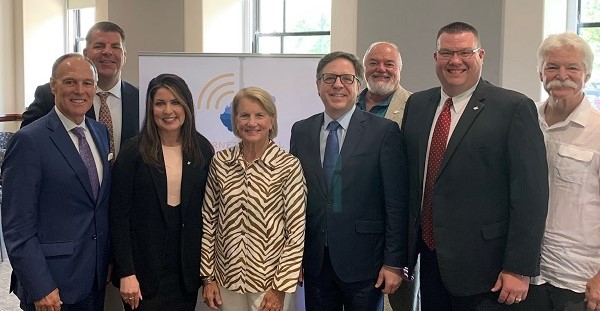MORGANTOWN – Sen Shelley Moore Capito and Gov. Jim Justice joined with National Telecommunications and Information Administration Administrator Alan Davidson on Friday to celebrate the $1.2 billion coming to West Virginia to extend broadband coverage across the state.
“Today, the internet’s a necessity not a luxury,” Davidson said at a press conference in the governor’s office. But millions of homes across the nation – including 271,624 homes and small businesses in West Virginia – lack access to a high-speed internet connection. “We finally have the resources to do something about closing that divide.”
The resources come via the $42 billion Broadband Equity, Access and Deployment (BEAD) Program through the Infrastructure Investment and Jobs Act. West Virginia is slated to received $1.2 billion.
Justice made a point to read the entire number: $1,210,800,969.85.
“We know we were way behind the times,” he said. Addressing Capito, he said, “We thank you for helping us – bringing us all on board … with the rest of the world.”
Capito said the allotments were based on need and West Virginia’s allotment was 11th highest among the 50 states. “That shows overall we had a problem.”
The money goes to bringing service to unserved and underserved areas, she said, not to overbuild existing infrastructure or boost speeds for areas already served.
She and Davidson both said each state must have a build-out plan in place before money can flow in.
Kelly Workman, director of the West Virginia Office of Broadband, explained the timeline. The required five-year plan will be submitted to NTIA by Aug. 11.
Following that is an initial proposal on how the state intends to spend the money; it has 20 sections in two volumes. Volume 1 will be submitted in October.
NTIA will review it and allow the state to begin its challenge process, where it chooses which national broadband map it will use, and post the locations for a 30-day comment/challenge period, Broadband providers may comment on the plan. If a challenge is received, other providers have 30 days to rebut the challenge and the state then gets another 30 days to reconcile all the locations to receive service.
She expects this to run through next spring and the state could look for its first installment – 20% of the total – next summer for the first grant program applications.
Then comes the final proposal. Remaining funds can be awarded in several rounds. That will occur over a couple of years. All the build-outs must occur by the end of 2029.
The officials fielded a question on what the BEAD money means for business recruitment to the state. Justice said “We can’t expect people to come if we’re living in the dark ages. This is the highway of the future.”
Thinking nationally, Davidson said, “You can’t build a business if you don’t have connection to the internet. We know it’s essential.” And we’ll have a more resilient country with everyone able to participate in the modern economy, he added.
State Economic Development Secretary Mitch Carmichael addressed the issue of impatience, with people wanting service now and not in 2029.
If all the BEAD money was dumped into the marketplace now, he said, the state would be unable to absorb it. “We will do this thoughtfully and progressively.”
West Virginia already has 38 ongoing projects providing service to 40,000 people over the last year, he said, and is upgrading 120,000 customers to fiber.
Tweet David Beard @dbeardtdp Email dbeard@dominionpost.com




